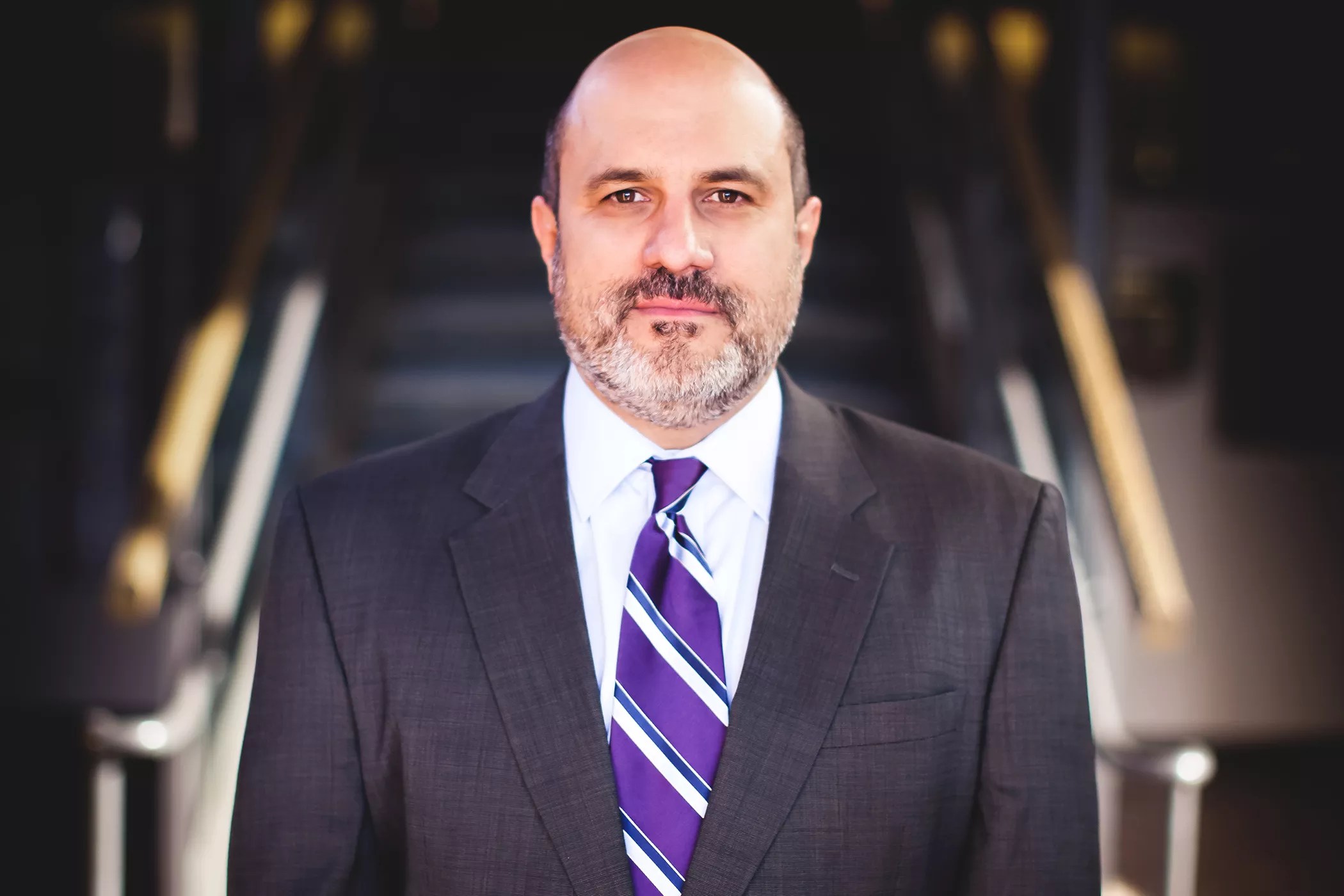
Courtesy Michael Fields

Audio By Carbonatix
Only the governor of Colorado or a supermajority of legislators have the power to convene a state law-making session. But last year, the order came from Michael Fields – at least, that’s how it felt to many politicians.
Fields, president of the conservative advocacy group Advance Colorado, led a pair of ballot measures in 2024 to dramatically cut property taxes and set strict growth limits. Fearing the impact on government budgets and operations, Governor Jared Polis called a special legislative session in August, during which lawmakers passed more modest property tax relief as a compromise. In exchange, Fields withdrew the measures.
Legislators called themselves an afterthought and rubber stamp in backdoor negotiations between the real decision-makers, Polis and Fields. They practically had “a gun to our heads,” one Democrat representative lamented.
The show of political force earned Fields a nickname among lawmakers: Governor Fields.
He’s not a fan of the title.
“The power comes from the people,” Fields says. “I can’t do anything without grassroots support, without donor support, without polling. …A large number of Coloradans agree on these policies. Legislators either have to pay attention and do something about it, or we’re going to.”
The “Governor Fields” moniker is the closest any Republican has gotten to the Colorado governor’s office in years. Coloradans haven’t elected a Republican head of state since 2002, when Bill Owens won a second term. In fact, Democrats currently hold all statewide executive offices, both U.S. Senate seats and a majority in the state House and Senate. Despite minor Republican gains in November, Democrats have the strongest hold over Colorado since 1938.
That hasn’t stopped Fields from finding political success. His star has been on the rise since he led the opposition against Proposition HH in 2023, defeating the Democrat-backed property tax measure and forcing another special legislative session.
That conservative victory came on the heels of the Colorado GOP’s “extinction-level” performance during the 2022 election. Fields rode the momentum of the win into the 2024 election, running five ballot measures with Advance Colorado. Of them, two were passed by voters, two led to the legislative compromise, and one failed by less than six percentage points.
While he doesn’t hold public office, Fields’s recent statewide policy achievements outweigh those of most Republican elected officials in Colorado. And the state’s politicos have taken notice.
“Whether you agree with him or not, Michael Fields has become a conservative counterweight in Colorado,” Polis says, adding that Fields “has worked effectively both as an outside advocate and as a deal maker.”
Fields isn’t slowing down anytime soon.
Advance Colorado has already filed seventeen statewide ballot measure proposals for the 2026 election; the measures primarily revolve around immigration, crime, taxes and fees, setting the agenda for Colorado politics nearly two years out from Election Day.
“There’s a disconnect,” Fields says. “Coloradans support Democrats on the ballot, but they want a tax cut. Or, for example, we did a ballot measure to make sure violent criminals stay in jail longer. That lost on a party-line vote [in the legislature] last year, and then voters supported it more than any other citizens’ initiative.
“There is a gap sometimes between what the people want and what legislators are willing to do,” he continues. “It’s about finding those disconnects that can help make Colorado better.”

When Advance Colorado can’t make progress at the Colorado Capitol, it moves to the ballot box.
Hannah Metzger
Red in a Blue State
Fields is used to being the only Republican in a room.
Today, the 37-year-old father of five lives in Parker, but he grew up in Chicago in a conservative family. They were a rare, right-leaning household in a leftist neighborhood, and their political affiliation was uncommon among their relatives as well. Fields says his father, an Ivy League-educated seminary professor, was the lone conservative in a Democratic family. (His great-grandparents once even received an award from Hillary Clinton, he says.)
Fields describes himself as a lifelong Republican. He first became interested in politics after 9/11, exploring foreign policy as a thirteen-year-old. He restarted the College Republicans group as a student at Valparaiso University and, after earning a bachelor’s degree in political science, moved to Colorado to study law at the University of Colorado Boulder.
In law school, Fields bumped shoulders with people who would become some of the most influential Democrats in the state. He got to know Senate President James Coleman through his work with ACE Scholarships; became friends with Alec Garnett, former House speaker and gubernatorial chief of staff, through playing softball with his brother, Andrew; and met Polis when the governor was a congressman and Fields was an intern for U.S. Senator Mike Enzi of Wyoming.
His personal connections across the aisle helped influence Fields’s approach to politics. Polis even appointed Fields to his Behavioral Health Task Force in 2019.
“I don’t like that politics has turned into, ‘If you’re part of another party or you disagree with me, you’re the enemy,'” Fields says. “I’m very conservative, but [Democrats] are not my enemies. They’re good people. If we can agree and get something done, let’s work together. If we can’t, we’ll settle it with voters and then we’ll get on the next issue.”
Fields took a swing at public office just once, in 2014. He ran for the Colorado House of Representatives in District 37, losing in the Republican primary. Fields, then 25 years old, was endorsed by the district’s outgoing representative and out-fundraised his opponent, Jack Tate, but Tate beat him with nearly double the votes.
The loss taught Fields the importance of grassroots activism, he says, noting that his money and insider approval failed in the face of Tate’s army of passionate supporters knocking on doors and collecting signatures.
Fields followed that philosophy to the Colorado chapter of Americans for Prosperity, leading the conservative nonprofit’s policy advocacy. He continued the work in 2018 as executive director of Colorado Rising Action, another right-leaning advocacy group, and then as president of Advance Colorado in December 2021, after he helped found the group in 2020 with a community coalition including former Aurora City Councilmember Dustin Zvonek.
“I would much rather be in the position I am than be in elected office,” Fields says. “It’s as influential as you can be as a conservative in Colorado right now. … There is no doubt that I’ve been able to be more influential doing the work that I do than if I was at the Capitol.”
When he took the helm of Advance Colorado, Fields shifted the organization’s focus from training Republicans to run for office, to pursuing ballot measures. Colorado is one of 24 states that allow citizen-initiated measures, letting residents bypass the legislature and petition to bring policy proposals directly to voters. Even rarer, it is among only eighteen states that permit citizens to bring forward ballot measures to amend the state constitution.
In that, Fields discovered the key to achieving Republican success without needing to win Republican seats.
Taking Party Out of Politics
The Republican Party has seen better days in Colorado. The state historically leaned red, with only four Democratic presidential candidates managing to win Colorado between 1920 and 2004. But since 2008, the state has gone to Democrats exclusively, quickly shifting from a swing state to solidly blue.
These days, the Colorado GOP is best known for its many controversies. The party’s headlines from the past year have included Chair Dave Williams directing members to burn LGBTQ pride flags, sparking a long and ultimately failed effort to remove him from leadership; public infighting over primary endorsements and election-denying rhetoric; and, most recently, picking an ex-reality TV star and convicted felon who called for political violence to lead a local party chapter.
While the national and state parties focus on personality politics and hot-button social issues, Fields says he is taking the opposite approach.
“Ballot measures are truly separate from party politics,” Fields says. “When we put a measure in front of you, ‘Do you want to stop fentanyl drug dealers?’, voters are not thinking about national politics. They’re thinking about, ‘I knew somebody whose kid died because of fentanyl.’ It becomes very much personalized, regardless of party. That’s why we have been and continue to be successful on issues.”
The party drama is “not helpful,” Fields says, but he thinks it’s largely irrelevant. He notes how opposition from the state party didn’t prevent Republicans Gabe Evans and Jeff Crank from winning their seats in the U.S. House – Crank even beat Williams himself in the Republican primary.
“Political parties have become less and less influential, especially party structure,” Fields says. “The Republican Party, the people in it, are much bigger than state party infrastructure. …While this state is not a Republican state at all, they’re more unaffiliated than anything. They lean left on certain issues and right on other issues. It’s about focusing on the right issues.”
Advance Colorado supported ballot measures to reduce the state income tax and require voter approval for the creation of certain state enterprises during the 2020 and 2022 elections, all of which were passed by voters. In 2023, it led the opposition effort to the failed Prop HH.
Last year, the group got five measures on the ballot. Fields says he counts four as victories: two resulted in the property tax compromise and two were passed by voters, creating a $350 million fund for law enforcement and increasing minimum prison time for some violent crimes. The latter passed despite opposition from the Colorado Democratic Party. The only measure that failed, a constitutional amendment to codify the right to school choice, was supported by 49.32 percent of voters.
Under Fields’s leadership, Advance Colorado also successfully sued Democratic state legislators for using an anonymous voting system to prioritize bills for funding, ending the practice. It’s impacted some legislative bills as well, he says, such as advocating for lowering the amount of fentanyl that qualifies as felony possession or fighting the failed addition of regulations against charter schools.
As the group’s influence grows, so does the criticism against it. A so-called dark-money group, Advance Colorado does not disclose its donors (claims that it is funded by billionaire Phil Anschutz have not been confirmed or denied). That lack of transparency inspired controversy during the special property-tax legislative session, as some argued that anonymous wealthy individuals were holding the “government hostage” and forcing legislators to “negotiate with oligarchs.”
Condemnation continued among state legislators when no one from Advance Colorado, much less Fields, testified in person as the lawmakers debated the property tax compromise that he helped create.

Jon Caldara knows the power of ballot measures.
Independence Institute
Some people on the political right have been wary of Fields’s policies. Jon Caldara, president of the Independence Institute, notes that the libertarian think tank publicly opposed Advance Colorado’s two property tax ballot measures in 2024. Caldara calls the measures “poorly written, while very well intended.”
“It would have required the state legislature to re-write just about every property tax law and rule that they have to somehow figure out the winners and losers,” Caldara says. “I’m thrilled that they used it, instead of putting it on the ballot, to extract a small concession from the state legislature during the special session.”
Regardless, he is “very glad that Colorado has Michael Fields,” Caldara says.
“Michael Fields is an intelligent guy with a bright future in politics,” he adds, “and he’ll get even more effective as he gets some wisdom that comes with age.”
Fields argues that he represents not just his group or its donors, but a majority of Colorado voters who support his ballot measures. Just getting a proposal on the ballot requires petition signatures from over 124,000 voters.
“What some of those legislators don’t like is that some Coloradans disagree with them and are willing to sign a petition and vote differently,” Fields says. “We have [citizen-initiated] ballot measures in Colorado for a reason, and it’s to have a check over elected officials.”
He believes Colorado voters will continue to diverge from their elected representatives in future elections.
Finding the Disconnect
From here, Fields says Advance Colorado plans to run four or five statewide ballot measures every other year, continuing the model it set in 2024. (That’s for even-year elections because, during odd-year elections, all statewide ballot measures legally have to relate to the Taxpayer’s Bill of Rights. Fields is uninterested in such measures, calling them “only tax increases or taking TABOR refunds.”)
Advance Colorado already filed seventeen proposals for the 2026 election as of March 3. Two were withdrawn, eleven are awaiting review by Legislative Council staff and four have advanced to the Title Board, an early step in the lengthy process to earn a spot on the ballot.
The wording and details of the proposals will most likely change before they make it to the ballot, if they make it at all, and some address the same topic with small differences. But they generally seek to do the following:
- Require law enforcement to cooperate with federal immigration and deportation operations (state legislators rejected a similar proposal in February)
- Increase the penalties for selling and possessing fentanyl
- Increase the penalties for retail and auto theft
- Require voter approval for the state to establish certain fees
- Codify the existing voter approval requirement for the state to create certain new enterprises in the Colorado Constitution
- Prohibit state and local governments from banning or restricting the use of certain energy sources
- Reduce the state income tax rate
- Codify the right to school choice in the Colorado Constitution (the same effort that failed last year)
“It’s not an easy process: It’s expensive, it takes a lot of work, but we do feel it’s an important check and balance on what really is a single-party power in Colorado,” Fields says of the ballot measures. “If it’s good for Colorado, why would you not take advantage of that to bring it to the people and put it up to them?”
Republican State Senator Barbara Kirkmeyer says Colorado’s citizen initiative process has been largely dominated by Democratic politicians and center-right political organizations. As a Republican, Fields’s use of the measures has been influential, she notes.
“While Republicans have struggled to elect a majority of policymakers to the state legislature, Michael Fields has been able to help supplement the effort with center-right fiscal conservative policy through the initiative process,” Kirkmeyer says. “He has had a big impact, and I suspect he will continue to do so for many years to come.”
While Fields says he doesn’t plan to push any statewide measures in 2025, Advance Colorado is considering city- or county-wide initiatives regarding crime and immigration. The group also intends to back conservative candidates in city council and school board races.
He says he’s looking to the Colorado Democrats’ playbook to build the political party back from obscurity.
“It wasn’t overnight that Democrats took over,” Fields adds. “They started back in 2006 and it culminated in 2022. …We need to do the same thing the other way. Being conservative in a state like Colorado right now, you have to have a long view. You have to be training people. You have to think about how to do stuff locally.”
He’s not in a rush for Republicans to seize control of the state – he’s already shown he can advance a conservative agenda without that. Still, Fields says he worries about the direction the state is heading on some issues, pointing to its recently declining standing in national rankings for business friendliness, public safety and affordability.
Until that changes, he says, voters will continue seeing his proposals on their ballots.
“We’re a great state. I love Colorado and want the best for it. But we are slipping on a lot of different metrics,” Fields says. “There are things that have gotten worse while there’s been single-party control. That gives us a platform to provide an alternative policy set.
“We still have more work to do. …And we might have to do it one at a time.”